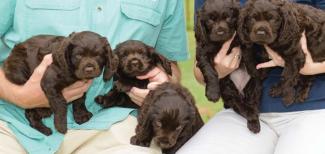By Barbara Fawver and Margarett Wolf
Texas Trace Boykin Spaniel breeder Greg Copeland of Hempstead, TX, is a puppy expert. His 20 years’ breeding the affable, rugged little hunting spaniel, also known as the state dog of South Carolina, has given him hands-on knowledge about what’s involved in raising healthy, happy, beautiful, well-bred puppies.
“Behavior can be inherited, but dogs also are a product of their environment,” Copeland says. “Early socialization is critical, but this foundation must continue with the new puppy owner. Puppy behaviors will persist into adulthood if left without training and direction. Undesirable behaviors left unchecked will worsen, and positive behaviors need to be nurtured and reinforced.”
Socialization from four to eight weeks of age, often defined as the critical early socialization age, is of paramount importance to breeders. Since puppies typically start going to new homes around eight weeks of age, breeders’ efforts to introduce puppies to diversified experiences and stimuli to prepare for the transition can be pivotal.
Cindy Nunneley Biehler, a 20-year breeder of Irish Wolfhounds in Independence, KS, says, “I strongly believe that early socialization is key to how an Irish Wolfhound puppy turns out. Genetics play a huge role, too. A dog with solid temperament will pass those genes on to his offspring, and a sound bitch will not only pass on good genetics, but also teach her puppies to be confident.”
Genetics and environment interact in complex ways, explains Kathryn Lord, PhD, postdoctoral associate at the University of Massachusetts Medical school, who is studying the genetics of social behavior in dogs compared to wolves. “Wolves start walking two weeks earlier than dogs, and walking is the start of the critical period of socialization,” she says. “Although both species have a four-week primary socialization period, dogs have all their sensory perceptions during this time, while wolves have their sense of hearing for only three weeks of this period and their vision for only two weeks.”
Dr. Lord’s research, which began in 2004 and is ongoing, has involved studying the behavioral responses of wolf and canine pups during this critical socialization periods. She presented an abstract of her work in May at the Purina-sponsored International Conference on Canine and Feline Genetics and Genomics in Saint Paul, MN.
“The earlier occurrence of this critical socialization in wolf pups means that they have a narrower set of information during the time their brains are most highly malleable, or shapeable,” says Dr. Lord. “We hypothesize that this simple shift in developmental timing could be due to small changes in gene regulation, yet have a major effect on adult behavior. We have just begun a genome-wide study to identify these genes.”
Shaping Puppy Social Skills
Breeders who work to shape puppies’ social skills are instrumental in helping them become well-adapted adult dogs. “Puppies that we notice as not being as outgoing or not having as much drive are the ones we spend more time with in controlled situations,” says Copeland. “It makes a difference. We are usually successful in getting them to be more engaged.”
Taking dogs out of their whelping box environment is essential. “We practice comprehensive socialization with our Boykin puppies,” Copeland continues. “This means they meet lots of new people, new dogs and new places, and we safely expose them to stimuli such as household and outdoor noises and a wide range of surfaces from grass and gravel to carpet and tile. They experience riding in cars and all-terrain vehicles.”
As for her gentle giant Wolfhound puppies, Nunneley Biehler says, “From the time puppies re born, they are exposed to soft music and being held every day. At four weeks, I start teaching simple commands such as ‘come,’ ‘sit’ and ‘wait.’”
Like Copeland, she introduces household and outdoor noises and lets puppies experience delivery trucks, the mail carrier and people coming and going to her house. “By five or six weeks old, they have really come into their own personalities,” she says. “These Wolfhounds get big—males may weigh two-hundred and fifty pounds and be thirty-eight inches at the withers—so their having an easygoing temperament and being properly socialized are important in helping them become adaptable.”
Both agree that the best part of being a dog breeder is producing puppies that people fall in love with as a member of their family. “I love raising Irish Wolfhound puppies and making friends for a lifetime from all over the world,” Nunneley Biehler says. “I strive to preserve the breed and produce all-around quality Irish Wolfhounds that families consider the perfect pets.”
“We get the greatest pleasure from the gift of love and companionship that a Boykin Spaniel puppy provides a family. This is why we raise puppies,” Copeland says.
Puppy Socialization Toolbox
- Take time to nurture and handle each puppy several times a day.
- Leave light music playing whenever you are not at home for a calming effect.
- After puppies have had their vaccinations, take them along on your excursions whenever you can and be sure to bring treats for training and dog baggies for waste.
- Introduce puppies to the world outside the whelping box—new people, new dogs and new places—ensuring they have positive interactions by using common sense and safety considerations.
- Expose puppies early to household noises such as the vacuum cleaner, blow dryer, blender, washing machine, clothes dryer and to outdoor noises such as the tractor, lawnmower, weed eater, blower and all-terrain vehicles.
- If your breed is a Hunting/Sporting breed, start early gradually introducing loud sounds such as banging on pots and pans to reduce fear of noise.
- Welcome visitors, including adults, children, babies and seniors and teach them how to properly handle puppies.
- Socialization does not expire. You should continue exposing dogs to new experiences throughout their lives.

